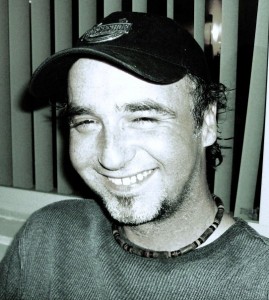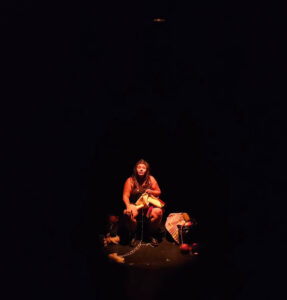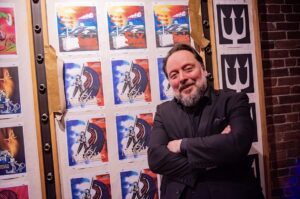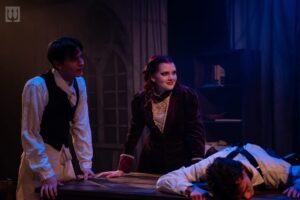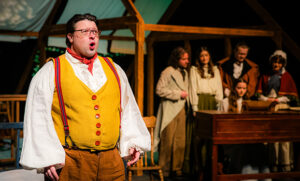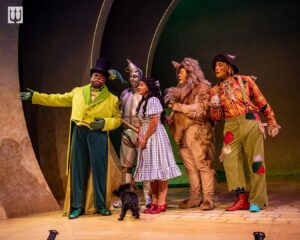michael melski
Michael Melski has a penchant for hats. I remark this to him as we sit down for beers (him) and Spuds (me) at the Foggy Goggle in Halifax after the second day of rehearsal for his newest play Eighteen, a co-production between Eastern Front and Neptune Theatre opening on May 2, 2013. Eighteen centers on an elderly couple who find the Fountain of Youth at a Florida golf course and suddenly wake up to find that they are eighteen again and faced with the adage, “If you could do it all over again, would you do it differently?”
It seems that Melski’s name has been everywhere these days. He has just come off seeing his critically acclaimed film Charlie Zone play to enthusiastic and full houses in Halifax, Sydney and Toronto. It was just announced that his play Hockey Mom, Hockey Dad will open the Neptune Studio Season in October, starring the hilarious and charming Heather Rankin and Kevin Kincaid. Eighteen is the second of his plays to grace the Studio after The Fly Fisher’s Companion was an audience favourite there in 2011. Everything, it seems, is coming up Melski.
Since I am more familiar with his films Touch & Go (2003), Growing Op (2008) and Charlie Zone (2011) I decided it was best to begin there.
Amanda Campbell (AC): How did you get into doing film? I feel like that’s not what most playwrights do. It’s kind of weird. In a really good way.
Michael Melski (MM): The beginning was always film. My dad was a big movie buff. Theatre happened a little bit by accident. I applied to York Film School and got accepted when I was eighteen and my parents convinced me, I was very close to my grandfather and his health was not great at that point, they convinced me to stay close to home for my first year.
AC: Yeah, my parents did the same thing.
MM: So I went to Kings for Foundation Year and I loved it. I acted a bit in High School, but I really got into acting at Kings. I played The Bear in Chekhov’s The Bear in the first semester and then I got cast as Snoopy in You’re a Good Man, Charlie Brown. I was learning a ton in Dal Theatre classes and really had an amazing eye-opening experience in FYP, the Foundation Year. Then, when it came time to go, I absolutely did not want to leave Kings. In the second year I started writing my own work and directing my own work in the Pit. By third year I was the Society President and I did two new plays that year and by the fourth year I started the first Festival of New Work. There were six plays; I think I did two or three that year. So, I left with seven plays under my belt, so I had a jumpstart. I was always going to come back to film. Some of the plays sucked, believe me, I was there. But some of them were… promising. But, I mean, you’re finding your voice at that point. You have to expect to suck a little. I was always writing. I formed a theatre company in Toronto for awhile. I came back to Halifax to put on the first Halifax Theatre Explosion in 1993: the precursor to the Pop Explosion and all the other Explosion Festivals. It was meant to be a winter Fringe Festival. It took place at City Centre Atlantic- in the mall. The first version of The Fly Fisher’s Companion happened there when I was twenty-four. Starring John Dartt who ended up playing the part at Neptune. I directed Shaun Majumder in his first play at the same festival. We’re still friends.
AC: That’s awesome.
MM: Then I went back to Toronto and went to film school at Ryerson for a year and wrote Caribou, which ran at the Clinton. That was the first one where people really started to perk up and like, take notice. I went back to Halifax and did my first and only Fringe Festival- Joyride-
AC: What year was that?
MM: 1994. It was the big hit of the Festival and Glen Walton who had been at the Film Centre saw it and said, “This has got so much film potential, you should adapt it and apply to the Film Centre.” And at Ryerson everyone was talking about how, “When I graduate after four years, I’m going to go to the Film Centre.” And I was like “What is this Film Centre?” I didn’t know it was the Norman Jewison Film School- very hard to get in to and Glen’s like, “you should adapt your play into a screenplay and apply.” So, I blue-skied it and said “Why not?” and I did and I got in. And Joyride was published that year. It was sort of an explosion after a long time of working really hard. It was a nice perfect storm. Suddenly, I had opportunities in both film and theatre. I’ve never quite let either of them die. I’ve seen some of the big money in writing for television, but it wasn’t what I wanted to do, creatively. I have kept making a concerted effect to keep writing for theatre. I’ve been getting great opportunities with Eastern Front and Neptune Theatre here to develop new things. I’m super excited about the new Charles Manson story.
AC: ME TOO.
MM: It’s gonna be fun. So many good scenes. We’re going to read a bit of it at the [Eastern Front] Stages Festival.
AC: Oh good! Oh, sweet! I’m so stoked about that.
MM: It’s the kind of thing I love sinking my teeth into. It’s a good love triangle and it’s a small, contained play about big ideas. In a way Eighteen is like that. Eighteen is a little more sprawling, but it has to be, it’s a comedy, it’s fantasy, it’s fun. But Creepy and Little Manson is gonna be a real chess game, mentally and emotionally. What if you saw a monster taking shape in front of you, who was still human, part of him was human, but part of him wasn’t. What would you do about it? To me, that’s a big theme in it. I judge every idea I have now by, “is this worth spending two years on?” because that’s how long it takes. That’s how long Eighteen took from the beginning.
AC: I think that’s so important. I think it’s so important to let the work take that long, as long as it needs to, to percolate.
MM: You can’t rush. It takes a long time for a play to be good. It takes some workshopping. The cast [of Eighteen] the last two days, we finished the workshop. We have been making some tweaks, we can deepen it here- here is a laugh- we’re still finding new things.
AC: You’ve just started rehearsals, right? Yesterday?
MM: Yeah. There’s a lot. (laughs) There’s lots of characters. There’s only four actors but they are playing multiple characters. Not only does each actor have his own base character they also play another character at a different age. So, it’s a real mind-bender. The actors are having to, not just learn their own character, but also absorb a character at a different age. So, they have a lot to do. It’s good, it’s going to be very energetic and kinetic. There’s magic. There’s a real element of magic in the show- the whole Fountain of Youth. I think it’s not just light, it’s got- one thing that we’re really finding and I’m happy about is that, I think the best comedy is always rooted in character- real people- and the laughs are more palpable and resonant- and we’re really taking pains to find who those characters are and find what their pain is- what their- something that happened in their lives that they lost their appreciation of time. They lost their appreciation of the gift of what life is and its possibilities. And, in doing that, they lost the gift of being able to love each other and appreciate each other. The biggest journey of the play is for the main characters to realize what they have done and that you don’t get a second chance- you really do have to do it right the first time. And live with it. And, how do we all survive that? Our common fate is mortality, so, it’s fun, it’s nothing like anything I’ve ever done before.
AC: I does make me think, just as you’re talking, about the idea of running out of time it makes me think of Darcy in your film Touch & Go. He’s wasting time. He feels like he has endless time because he wastes it perpetually.
MM: You know, that’s true because, there is a sports theme, golf… and the character Rhys [Bevan-John] plays is a biathlete, he’s a cross country skier/ rifle shooter- he’s an Olympic prospect, so Ben [Robbie O’Neill], who once had a very promising golf career until he got married and had kids, and he has a lot of pent up resentment about destiny- he names his daughter- played by Andrea [Norwood]- after Jack Nicklaus- her name is Jackie. His life was golf and it slipped away. So, he really has some funny moments with coming to grips with that. Rhys’ character, Kent, is very, completely driven, narcissistic even, the way that athletes are in their prime. When they find the Fountain of Youth the old guy, played by Robbie [O’Neill], when they wake up, they are played by Rhys and Andrea. So, they get to extend their characters as young people. In Act II, because Rhys and Andrea are like Darcy, they’re treading water, they don’t want to give up their youth, Rhys’ character is terrified of growing old. He’s got Gerontophobia. He gets the shakes around old people. Andrea’s character, due to the loss of her brother, is terrified of children. So, they’re phobic about children and phobic about growing old. So, they’re actually trapped in this place where they don’t want to grow up. And, of course, in Act II, the reverse of what happens to the parents happens to the kids. The kids, overnight, wake up and they go from being in the prime of their lives to being seventy years old. And being forced to deal with things like, suddenly you wake up and you don’t remember your Internet password and Jackie, who is obsessed with the Internet, suddenly has to deal with Internet withdrawal. Kent’s whole Olympic career has evaporated. In a comedic way. People are forced to question what their lives are really about. What are they doing with time? There’s a fascinating study I read, about how 18 year olds are living the same lives as 80 year olds because of the Internet. Social Media. They have virtual friends, that they never see, they inhabit small rooms and they are deeply depressed and lonely. Which is the way senior citizens are. It’s really interesting. There are so many interesting angles into it. The older couple get the chance to do it all again, with all their experience, to be young again. But it is still really easy to screw up.
AC: Well, sure. Otherwise senior citizens would just be doing everything perfect all the time.
MM: Exactly. They would be so wise about everything. But, everything- even their diets change- when the young people are suddenly seventy they’re afraid to go outside because somebody might recognize them, so they’re in this position of “we don’t want to leave the house because we’re ugly and old now” and they can’t even eat the same things. They eat through all their groceries, without ever leaving the house, and they have one Chimichanga left, which they eat, and it absolutely destroys their bowels. So, then there’s a scene of them going to Pete’s Frootique and shopping for stewed prunes and Fig Newtons and they LOVE it, it’s like they’re adapting to a new reality, which they never respected.
AC: It’s interesting because my grandmother is 92 and now she is eating the most like a 21 year old college kid than she has in her entire life because she doesn’t want to cook anymore and, sometimes we bring in healthy stuff, but sometimes we’ll just pick stuff up for her and I will ask, “What should we get?” And she will be like, “Let’s get pizza! Let’s get cheeseburgers!”
MM: Oh, that’s great. That’s awesome. It’s so nice when people don’t act their age.
AC: Yeah. And she grew up in a small town on Prince Edward Island in the 1920s, so when she was a teenager she was likely eating very healthy.
MM: Probably told to.
AC: Yeah. And she would have been eating food her neighbors were growing fresh. They couldn’t just go down to Superstore or eat in at Pizza Delight. So, now she’s making up for it.
MM: I wish more seniors were like that.
AC: But sometimes your body, as you get older, is like, “Shut this down!”
MM: Well yeah, Kent has to deal with waking up with an erection every morning to being completely impotent and having to go on those drugs. There’s a funny scene in the pharmacy where things go off the rails. There’s a lot of sex in this play, I am realizing. A lot of implied sex. Sex is something that, when you are suddenly eighteen, you suddenly start to feel those things again. Even though this couple has been so pissed off at each other and have fallen out of love- how much appreciation do we place on physical beauty? Suddenly they are really attracted to one another and they see what they have lost and forgotten about- so there’s some fun about that. I think it’s going to be a fun show. It’s selling really well, so we’re happy about that.
You can catch all the implied sex, the Fig Newtons and the Fountain of Youth at Neptune Theatre’s Scotiabank Studio Theatre (1593 Argyle Street) in Michael Melski’s Eighteen, beginning April 30th. The shows run Tuesday-Friday at 7:30pm, with shows at 4:00pm and 8:30 on Saturdays and 2:00pm and 7:30pm on Sundays. Tickets are $17.00-$42.00 depending on seating. April 30th is a Pay What You Can Performance. May 2nd is Opening Night. To purchase tickets or for more information please visit this website or call 902.429.7070.

